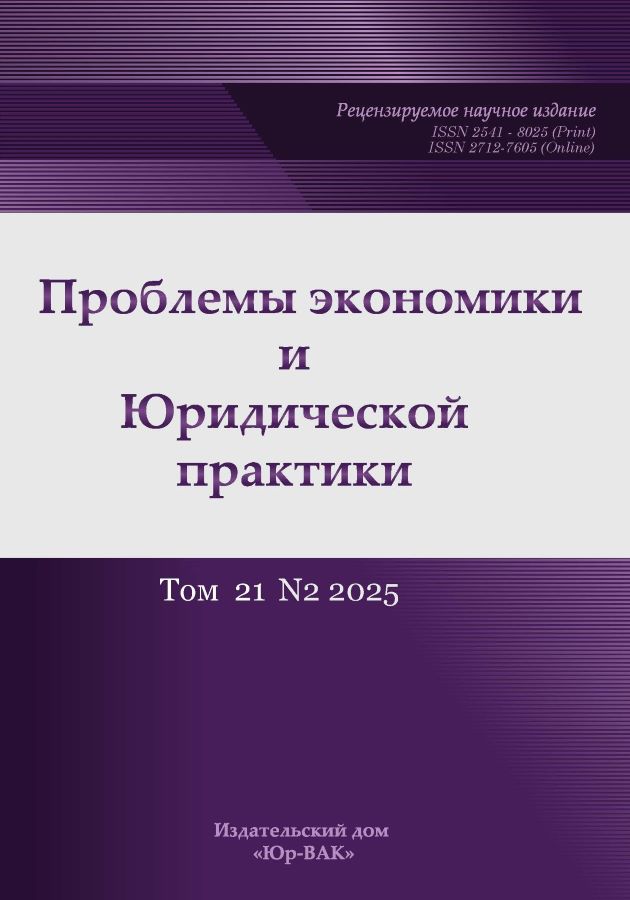Analysis of the implementation of concession agreements in Russia
- Авторлар: Afanasyev V.Y.1, Kalyuzhnaya N.A.1
-
Мекемелер:
- State University of Management
- Шығарылым: Том 21, № 2 (2025)
- Беттер: 218-226
- Бөлім: Regional and Sectoral Economics
- URL: https://journals.eco-vector.com/2541-8025/article/view/680388
- DOI: https://doi.org/10.33693/2541-8025-2025-21-2-218-226
- EDN: https://elibrary.ru/YQSOGC
- ID: 680388
Дәйексөз келтіру
Аннотация
The article is devoted to the analysis of the implementation of concession agreements in Russia, since 2005, when the law on concession agreements was adopted, to the present day. In the context of the active development of public-private partnership (PPP) and the corresponding legislative framework, the article examines the key stages of legal registration of concession projects and their impact on various sectors of the economy. The relevance of the topic is due to the growing interest in concessions as a tool for attracting private investment in infrastructure projects and the modernization of social facilities. The purpose of the study is to assess the effectiveness of concession agreements, their role in the modernization and development of critically important industries, such as housing and communal services, energy, transport and healthcare. The research methodology includes an analysis of legislation, a review of large concession projects, as well as statistical data on the implementation of concessions. The results of the study show that in Russia, concession agreements have proven to be an important mechanism for attracting private investment, especially in the field of public infrastructure and housing and communal services. It was also revealed that despite successful examples, there are problems with the quality of property valuation and legal risks. The conclusions emphasize the need for further improvement of the concession mechanism, in particular, in terms of improving the legal framework and conditions for project participants.
Толық мәтін
Авторлар туралы
Valentin Afanasyev
State University of Management
Хат алмасуға жауапты Автор.
Email: vy_afanasyev@guu.ru
Dr. Sci. (Econ.), Professor, Head of the Department of Economics and Management in the Fuel and Energy Complex
Ресей, MoscowNadezhda Kalyuzhnaya
State University of Management
Email: n.a.kalyuzhnaya@yandex.ru
Postgraduate Student
Ресей, MoscowӘдебиет тізімі
- Vishnivetsky, M. V. Modern mechanisms for implementing project financing in concession programs / M. V. Vishnivetsky // Innovations and Investments. —2024. —No. 9. —P. 105–109.
- Voronin, D. A. Development of a financial model of a technological project / D. A. Voronin, A. B. Zhdanova // Bulletin of Science and Education. —2024. —No. 1-1 (121). —P. 49–55.
- Ganeev, A. M. Offset contracts as a tool of public administration in modern conditions / A. M. Ganeev // Economic Sciences. —2024. —No. 216. —P. 391–393.
- Gerasimenko, O. A. Mechanism of project financing of a concession at the regional level / O. A. Gerasimenko, M. V. Semibratsky // Russia: development trends and prospects. —2020. —No. 12-1. —P. 922–925.
- Kudryavtseva L. V., Petrov I. V. Some aspects of the implementation of the rules on holding a competition for the right to conclude concession agreements in electronic form on electronic trading platforms // Society and Law. —2024. —No. 2 (88). —P. 111–116.
- Loseva O. V., Munerman I. V. Models for assessing and classifying regional investment projects implemented under concession agreements // Regional Economy. —2024. —Vol. 20. —No. 1. —P. 276–292.
- Satskevich T.K., Gazaryan D.G. Legal aspects of concession agreements as a tool for public-private partnership // Current research. —2024. —No. 20 (202). —P. 46–51.
- Sokolov, S.L. Development of public-private partnership in the agro-industrial complex of the regions of the Russian Federation / SL Sokolov // AVU. —2020. —No. 11 (117). —P. 93–101.
- Spesivov N.V., Titov A.A. On the issue of improving the legal regulation of investment activities and the role of the prosecutor in the implementation of investment projects // Bulletin of the Saratov State Law Academy. —2024. —No. 4 (159). —P. 195–202.
- Tikhomirov, D. V. Financial model as a decision-making tool in project financing / D. V. Tikhomirov // Bulletin of St. Petersburg State University of Economics. —2020. —No. 2 (110). —P. 44–51.
- Tropynin M. S. The importance of using the PPP mechanism for the modernization of primary health care in the Russian Federation / M. S. Tropynin, A. N. Plutnitsky, D. O. Roshchin // Medical and social journal of nursing. —2021. —No. 1 (11). —P. 29–35.
- Trotsenko O. S. Public-private partnership as a way to implement infrastructure projects / O. S. Trotsenko // Eurasian Law Journal. —2020. —No. 10 (149). —P. 159–160. —doi: 10.46320/2073-4506-2020-10-149-159-160.
- Filin D. M. Interaction between business and government in public-private partnership // Scientific search. 2019. No. 1. P. 73–75.
- Khannanova T. R., Garifullina A. F. Problems of assessing the effectiveness of public-private partnership mechanisms // Economy and Management: scientific and practical journal. 2019. No. 1. pp. 26–30.
- Khatskevich, E. M. Concessions in Siberia: implementation experience, barriers to development / E. M. Khatskevich, L. Yu. Tatarinova // ECO. —2020. —No. 1 (547). —P. 29–44.
Қосымша файлдар









